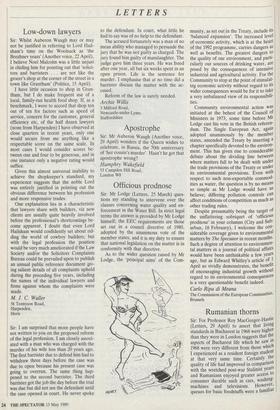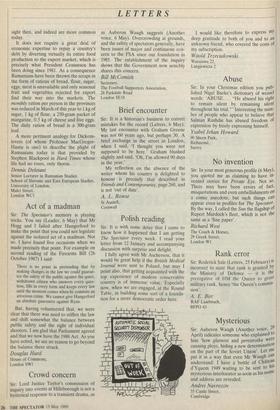Rumanian thorns
Sir: For Professor Roy MacGregor-Hastie (Letters, 29 April) to assert that living standards in Bucharest in 1968 were higher than they were in London suggests that the aspects of Bucharest life which he saw In 1968 were very different from those which I experienced as a resident foreign student at that very same time. Certainly the quality of life had improved in comparison with the wretched post-war Stalinist years and Rumanians enjoyed greater access to consumer durable such as cars, washing- machines and televisions. However, queues for basic foodstuffs were a familiar
LETTERS
sight then, and indeed are more common today.
It does not require a great deal of economic expertise to repay a country's debt by diverting virtually its entire food production to the export market, which is precisely what President Ceausescu has been doing since 1981. As a consequence Rumanians have been thrown the scraps in the form of rations of bread, flour, sugar, eggs; meat is unavailable and only seasonal fruit and vegetables rejected for export find their way into the markets. The monthly ration per person in the provinces was reduced in March of this year to 1 kg of sugar, 1 kg of flour, a 250-gram packet of margarine, 0.5 kg of cheese and five eggs. The daily ration of bread is a 300-gram loaf.
A more pertinent analogy for Dickens- lovers (of whom Professor MacGregor- Hastie is one) to describe the plight of Rumanians today is that provided by Stephen Blackpool in Hard Times whose life had no roses, only thorns.
Dennis Deletant
Senior Lecturer in Rumanian Studies School of Slavonic and East European Studies, University of London, Malet Street, London WC1



























































 Previous page
Previous page